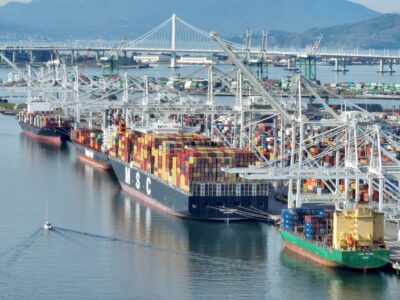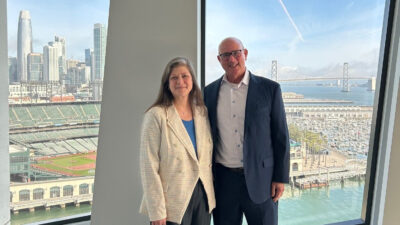BAY AREA COUNCIL HAILS DECISION ON SF COMMUTER SHUTTLES
The Bay Area Council hailed the decision by the San Francisco Board of Supervisors on April 1 that allows an innovative commuter shuttle pilot program serving thousands of workers across a range of industries to move forward. The Bay Area Council testified in support of the shuttles and the pilot program.
“This is a victory for sensible transportation solutions, for easing traffic and reducing carbon emissions and for growing our economy,” said Jim Wunderman, President and CEO of the Bay Area Council. “Commuter shuttles provide an important transportation option for thousands of San Francisco workers, taking cars off of already congested roads and highways and avoiding harmful carbon emissions. The commuter shuttle pilot program will provide valuable information that ensures the shuttles operate in close coordination with the city’s public bus system and minimize any impacts they have on neighborhoods.”
Over the past 18 months, the Bay Area Council has convened tech and other companies that run shuttles in San Francisco to work with city transportation planners and Mayor Ed Lee in developing the pilot program. The San Francisco Metropolitan Transportation Agency (MTA) approved the pilot program in January. It is scheduled to begin in July.
The shuttles each day provide an estimated 35,000 rider trips for thousands of San Francisco residents. The SFMTA estimates that the shuttles eliminate at least 327,000 single-passenger car trips and 8,600 tons of carbon annually, and avoid 43.3 million vehicle miles travelled annually.
A recent poll of 500 likely San Francisco voters by EMC Research in Oakland found that 70 percent support doing the pilot program. Opponents of the shuttles who have attempted to blame them for the city’s skyrocketing housing prices and rents appealed the MTA’s decision on the pilot program, arguing that it should have undergone a full environmental review under the California Environmental Quality Act.
“Concerns about lack of affordable housing are real, but the shuttles are the wrong target,” Wunderman said. “The entire region has failed over a generation to create sufficient housing and the soaring demand fueled by strong economic growth is now catching up with us. We must find new and innovative ways to create more housing across all income levels, and it’s an issue on which the Bay Area Council is focused.”
Among the provisions of the proposed pilot program are:
• Approval of 200 bus stops (out of over 2500 total in the Muni system) to be used by providers;
• Shuttle providers would have to pay to use Muni bus zones, based on a per stop, per day, cost recovery schedule. Due to Proposition 218, the SFMTA cannot create a fee structure that goes beyond the cost to provide such a service or policy;
• Providers would operate in accordance to agreed-upon guidelines, such as yielding to Muni and pulling to the front of the zone making more room for other vehicles, and avoiding steep and narrow streets;
• The SFMTA would enforce these rules to ensure only participating companies are using shared zones. It will be illegal to use all other bus zones;
• Each commuter shuttle will be issued a unique identification placard so enforcement personnel can easily identify vehicles; and
• Providers would share data with SFMTA to ensure that location information is available for complaint follow-up, enforcement and to support the agency’s transportation system management.





